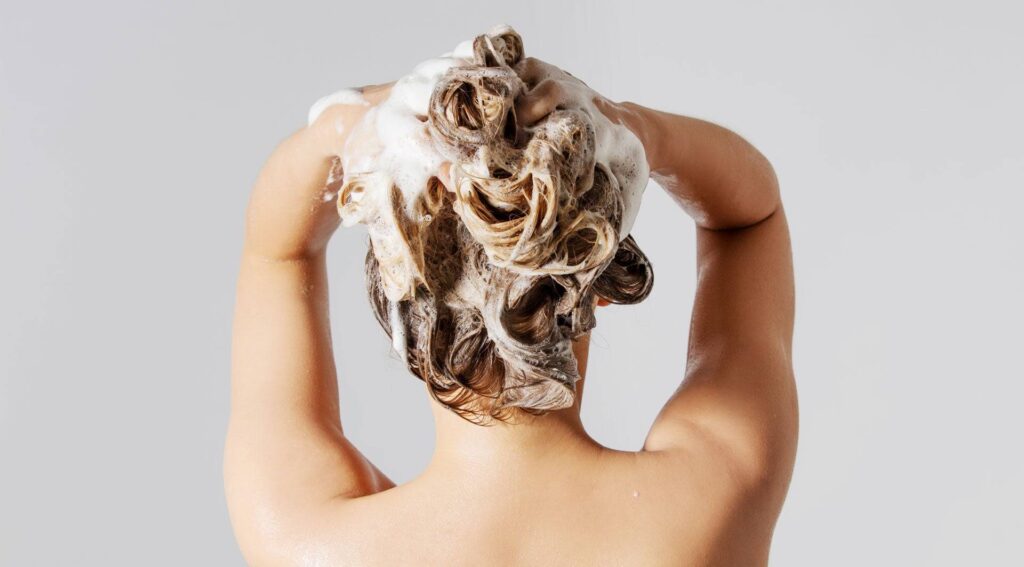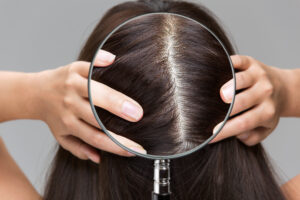If you’ve noticed your scalp becoming itchy, dry, or feeling “tight” as winter rolls in, you aren’t alone! Winter brings many different hair challenges, and oftentimes the hardest to overcome is a dry scalp.
Why does my scalp feel dry during the winter?
During the colder months, the air is drier, and moisture is constantly being drawn out of your hair as you go from cold and dry outdoor air to artificial indoor heat. Neither is good…let alone both! An unnourished scalp can also make your hair appear dull, lifeless, frizzy and lead to breakage. In severe scenarios – a dry scalp can even lead to hair loss if untreated!
Scalp Science
The scalp is composed of 5 different layers. While the top layer of skin similar to the rest of your body, the underlying layers consist of connective tissue, fatty layers, blood vessels, muscles, and nerves.
The skin on your scalp and the rest of your skin have (2) major differences.
1. Scalp skin is some of the thickest skin on the entire body (up to 8mm!) and carries more blood than other areas of skin on your body.
2. Your scalp also has many sebaceous glands that produce oil, that protects the hair.
The overwhelming number of sebaceous glands means properly cleansing your scalp is crucial to prevent oil and bacteria build up that can lead to clogged hair follicles or an itchy, flaky scalp.
*Many scalp conditions can go unrecognised because of your hair – if you feel like you have a serious scalp issue. Contact your dermatologist.
e problem.
So now that we understand some scalp anatomy… let’s run through a few “Do’s and Don’ts” to keep your scalp cleansed, moisturised, and healthy for winter weather.
DON’T- Scratch!
We’re all human, so naturally we might itch the scratch which in turn only makes things worse. Scratching can lead to further irritation and send you into a seemingly never ending itchy-irritated cycle.
Instead, use a scalp massage brush to gently exfoliate your scalp and relieve the feeling of tight scalp skin.

DO – Cleanse with the right shampoo
Since the scalp produces sebum, using a gentle yet clarifying shampoo is one of the most important steps to treating a dry scalp. Avoid shampoos that use harsh sulphates or chemicals as they can lead to further irritation.
Extra oily scalp?
Use Urgent Repair Shampoo. This gentle clarifying and restorative shampoo is based in Aloe Vera gel and formulated to remove product and oil build-up to improve hair and scalp health.
Sensitive scalp?
Aloetherapy Hair and Body Cleanse provides gentle replenishment of nutrients, essential amino acids, and moisture. Aloe Stem Cells amplify the legendary rejuvenation benefits of Aloe Vera while Water Lily and Oat Avenanthramides act as anti-irritants, proven to reduce redness and itch to soothe dry skin.

DO – Use pre & post wash treatments
Pre-Wash
Apply Beautifying Serum to your scalp prior to shampooing (or even the night before).
This unique blend of Neem, Argon, Cranberry, and Kukui nut oils fused with Omega Fatty Acids bring antioxidant, antibacterial, antifungal, and moisturising benefits that help nourish and protect your scalp (no matter what time of year).
Post Wash
Urgent Repair Treatment is formulated with extracts of peppermint oil, menthol, and camphor to help soothe a dry itchy scalp (and yes…this will give you that “tingly sensation” everyone loves!). Apply this intensive, protein-rich restructuring and replenishing treatment on cleansed hair to restore moisture and vitality to dry, stressed and damaged hair.
PRO TIP: Most conditioners are not meant to be used on your scalp. Since your scalp naturally produces oils, using a standard conditioner on your scalp is not recommended as it may lead to an extra oily scalp. Ensure that the treatment you are using is designed to be applied directly to your scalp.
DON’T – Suffocate your scalp with a hat
While wintertime hats are essential to keeping you warm and protecting your hair from harsh elements, the wrong material and fit can worsen your dry scalp. For example, if you trap your scalp in a tight wool beanie, it’ll begin to produce moisture (sweat), leading to blocked pores and bacteria growth, ultimately resulting in more irritation and itch!
Tips: Instead of a tight wool beanie, go for a naturally fibered, comfortably fitting hat that will allow for airflow and necessary circulation.
If it’s too cold for you to ditch the heavy winter hat, try an organic, pre-washed wool and be cautious of the longevity of your wear. Only wear it for a necessary period and remove it as soon as you’re in a warmer place.

DON’T – Use too much hot water
As amazing as a long hot shower can be, it’s not doing your skin or hair any favours. Hot water disrupts your skin’s protective barrier, opens pores, and allows inner moisture to escape. Which is not helping your dry scalp in any way. Obviously, we don’t want you struggling through a freezing shower so instead opt for lukewarm water when rinsing your hair.
DO – stay hydrated
Keeping the body hydrated and drinking water regularly (at least 9 glasses a day) is extremely important. Proper hydration improves the overall health of your skin and scalp. Drinking more water is the most inexpensive and easy way to help improve scalp health (and overall physical health) so get to it!







